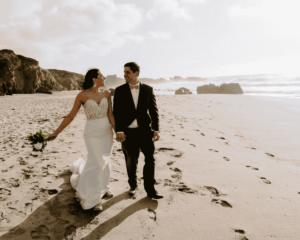Did you know that the destination wedding industry is expected to reach $64 billion in 2026?
The task of planning a wedding can be daunting. It can sometimes seem like a full-time job. You must plan out every little detail to know you’re getting the most out of your schedule.
Whether you want to plan fast or slow, you need to know the timeline for a wedding. Keep reading if you’re trying to figure out the average timeline for planning a wedding. We’ve got everything you need to know.
Setting a Wedding Date and Estimation Timeline
Setting a wedding date and timeline is essential to the wedding process. You should begin by selecting the desired date for the wedding.
This information will be used to select venues, vendors, and other services needed for the wedding. From there, you can create an estimated timeline.
This timeline should include all necessary tasks that need to be completed before the big day. This includes purchasing the wedding dress, picking out wedding colors, and drafting the guest list.
It should also include deadlines for when decisions must be made and when deposits and payments are due. Setting a timeline that outlines the necessary wedding tasks will help keep you organized and allow you to pinpoint any issues that need to be addressed to plan a successful wedding.
Craft the Theme and Wedding Details
The average timeline for planning a wedding should start at least a year in advance. This gives you the time to discuss your ideal vision and ambiance. Both of these are defining ingredients of a successful wedding.
You can also pick your color schemes and any unique elements you’d like to add during this time. Any extra decorations and elements required for the reception, ceremony, and so on can be purchased and arrive closer to the wedding date.
With such an organized timeline, you will inevitably enjoy the wedding day!
Establish a Budget and Allocate Funds
It’s best to start this process at least a year before the wedding, so there’s enough time to save up for the wedding costs and determine how to pay for the expenses. Start by creating a list of the wedding-related items you’ll need to avail yourself of, like finding wedding photographers near you.
Once you have a cost estimate, determine where the money will come from and set a budget. Allocation of funds can include setting aside money for the deposit on services, setting aside money in personal savings accounts, or setting up a payment plan with a financial institution.
Determine the Ideal Venue
After selecting a specific date, you must allocate at least six months to finding and reserving a venue. During this time, exploring multiple locations and understanding the cost of a wedding and fees is crucial.
Some venues will require additional time to plan and coordinate the arrangements. Reviewing and negotiating contracts with venues can help reduce potential stress.
Once the ideal venue has been identified and booked, you can focus on the other wedding details.
Finalize the Guest List and Invitations
Finalizing the guest list and preparing the invitations typically follow selecting a wedding date. This should take place 3-4 months before the event to ensure the time for all guests to receive and read their invitations.
When considering who to invite to the wedding and finalizing the list, you should start by making a draft of all possible guests. All immediate family members, close friends, and influential members of both sides of the family should be included and selected from various invitation options.
Once the list and design are chosen, ordering them 8-10 weeks before the wedding day is essential to allow plenty of time to ensure all invitations are addressed, mailed, and received.
Obtaining Necessary Permits and Licenses
You should wait until the venue has been chosen and the date is set before requesting any of these documents. You should consult with your church to determine the necessary permits and licenses if a wedding is in a church. For outdoor weddings, tickets may be required from city and county departments.
State-required marriage licenses should be obtained before the wedding day, and the waiting period for some areas can be up to six weeks. Applications for a marriage license should be made well in advance to allow for processing and to have the permit in hand before the big day.
Understanding all state, local, and county requirements for permits and licenses is essential to ensure a smooth wedding planning process.
Making Final Touches and Enjoying the Big Day
Once these essential elements are in place, you can begin planning the rehearsal dinner. This also includes reception and other events.
You may also have to plan events leading up to the wedding, like the bachelorette or bachelor party, showers, and other activities. As the wedding day approaches, the focus shifts to making the final touches, including addressing invitations and preparing the seating chart.
On the wedding day, you will want to enjoy your special day surrounded by your loved ones. All the hard work you’ve put into planning the event will finally be realized.
Determine The Perfect Timeline For Planning A Wedding
Overall, planning a wedding can be a fascinating and stressful process. You should arm yourself with the knowledge of a timeline for planning a wedding.
It would be best if you understood the resources available. Start planning today and enjoy the special moments of your special day! Good luck!
Did this guide help you? Visit our other blog posts to see what we offer and how we can help you.





Be First to Comment